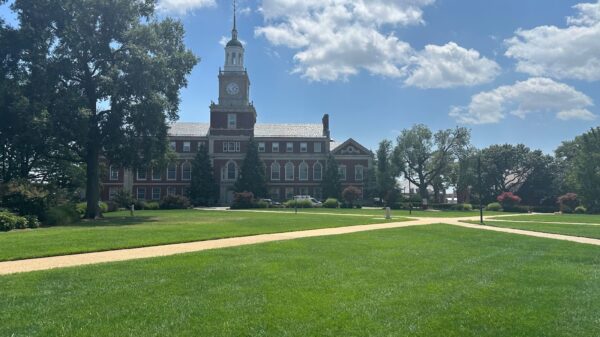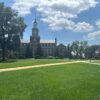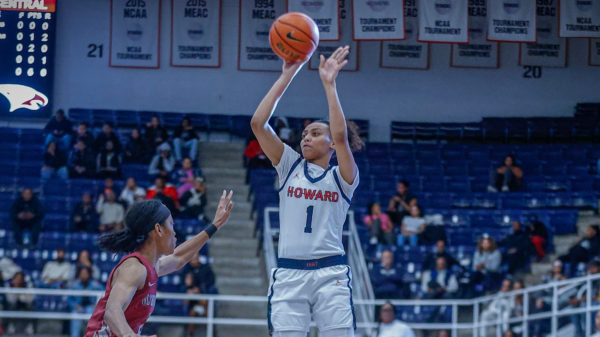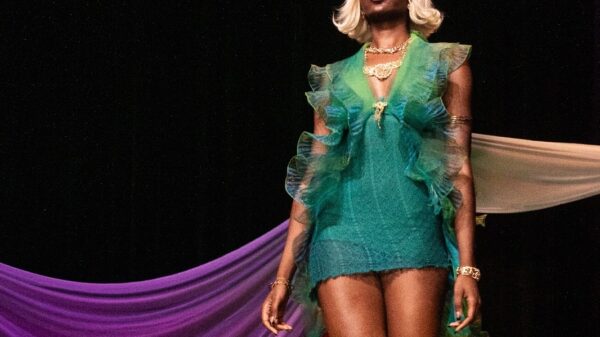Last month’s decision by Florida Governor Ron DeSantis and his administration to reject the College Board’s Advanced Placement (AP) African American History course has garnered much conversation and rightfully elicited a blowback.
The Florida Department of Education (FDOE) has claimed the material in the course lacks “educational value” is “historically fictional,” and is indoctrinating students to a political agenda. The fact is that the White nationalist Republicans view a course like this or anything related to teaching true US History and empowering the study of African people, as threatening.
In this climate where the study of Black history is under attack, the voices of scholars in the field of African American studies, also referred to as Black studies or the broader Africana studies, must be prioritized in order to have discussions grounded in truth and substance
Two of the scholars who contributed to the development of the course are Howard University Afro-American Studies associate professors, Dr. Greg Carr and Dr. Joshua Myers.
Both spoke with The Hilltop and provided their insights on topics including DeSantis’ decision, their perspectives on the course, and what it could mean for HBCUs.
Views On DeSantis’ Move
We have seen Republicans’ ongoing war on education and teaching history, inflamed by white nationalism since Trump and Republicans lost the 2020 presidential election. DeSantis has been leading the charge in that realm, banning books for academic use, censoring what can be said relating to race censoring what can be said relating to race across schools, and recently proposing dismantling diversity, equity and inclusion initiatives across Florida colleges.
The imaginary boogeyman of labels like “Woke” and “critical race theory,” and the lies that these things are being taught to K-12 students, corrupting them to hate America has become the center-piece of the GOP’s political agenda. What we’ve seen from DeSantis and the GOP is another iteration in the long history of right-wing politicians weaponizing white nationalist backlash/white fear from the changing of America (that changing of the US is evidenced by the recent elections in 2018, 2020, and 2022), in an attempt to hold onto what Dr. Myers calls their “dying breed of whiteness.”
Desantis specifically claims the AP course would be indoctrinating students to a left-wing agenda, and violates his “Stop WOKE Act,” passed in 2021, based on a draft of the AP Black History course.
“This was a political stunt by a man who wants to run for president of the United States. And, he got the headlines he wants. Now, onto the next sensationalist posture,” Carr said.
Referring to DeSantis’ actions as “fear mongering for political profit,” Carr points out that these efforts from figures like DeSantis engender resistance which was seen following the response after the Supreme Court’s overturn of Roe v. Wade, saying “this is all an exercise in anti-Black racism. He is overreaching. I think this is the kind of action that could energize people.”
The latest data from the 2022 Midterms has revealed DeSantis’ blowout re-election came as a result of lower turnout from non-white voters, and a drop in Black voters from 62 percent from the 2018 Midterms to 40 percent this time.
“We know that DeSantis secured his first victory by voter suppression and by stopping the count…and won re-election by a wide margin because of a combination of voter suppression and voter apathy,” Carr said.
As a Howard Law School professor, Carr also acknowledged DeSantis’ decision won’t survive legal challenge and addressed the importance of voting during an appearance on Roland Martin Unfiltered.
“He will crash and burn on the national sink….People have to go out and vote. It’s easier to do what Ron DeSantis has done when people don’t get in and wage war. War includes the ballot,” Carr said.
Thoughts On The Black Studies Course
Both scholars’ contributions to the development of the AP course involved reviewing material and providing feedback.
Carr fervently believes that centering Africa is an important aspect in the teaching of the history of African people in the US and was included for the Afro-American History AP class, making sure it did not begin with slavery. He says that there was a consensus on that among the scholars involved and he is proud that it was adopted into the course.
“You have to frame this with Africa because we are African people, and that made its way into the curriculum….We shouldn’t have a trauma or oppression based curriculum. This shouldn’t be a deficit based curriculum,” he said.
In delving into the history of African American Studies and the teaching of Black people in the US, Carr cited the works of scholars like Benjamin Lewis, George Washington Williams, Carter G. Woodson, W.E.B. DuBois, John Franklin, Lerome Bennett, among others, as being in that deep lineage and at the root of a class like the AP course.
“The course that we have now, the African American Studies AP Course, is neither original nor grounded in a moment where there was nothing that preceded it. This is just the latest iteration in this long intellectual warfare to educate our children and it’s an unbroken genealogy. It’s very important that we remember that, and that we tap into the momentum of memory of all that came before,” he said.
Carr also made sure to commend the College Board, saying they are “absolutely committed” referring to them as “good people.”
However, Myers noted the stark difference between the field of Afro-American Studies/Africana Studies and this AP course.
“The course doesn’t explicitly disregard the deeper Black studies questions, if you look at it closely. It doesn’t center them because how can it and still be an AP course, still be something the College Board sells so that it can have people earn advanced placement credits,” Myers said.
He acknowledged that most of the suggestions made by him were not included. He also revealed that he provided a sample syllabi from Howard but they did not implement any of the material.
“I was on the writing team. But nothing I wrote is reflected in what actually exists in the curriculum,” Myers said.
He asserted that the Black Studies scholars like himself were essentially only included to provide legitimacy for the course for the College Board and that they “kind of had an idea going in.”
When recounting a gathering organized by the College Board with all of the contributing Afro-American Studies scholars last April, Myers noted the lack of freedom they had to engage with each other to think further about the material for the AP course, saying “everything was so choreographed.”
“This is a corporation that believes in what it believes in already. It has a sense of what it thinks African American studies is,” Myers said, talking about College Board.
On Feb. 1, the College Board released an updated framework following the rejection by DeSantis made news. Some of the material that DeSantis’s administration targeted from the February 2022 draft included the material of scholars such as Kimberlee Crenshaw, Roderick Ferguson, Leslie Kay Jones and bell hooks. DeSantis and his people cited problems with topics like Black Queerism, Critical Race Theory, Black Feminism and the movement to abolish prisons. What the new framework does is notably omit those specific topics by name for the sections, a change from the previous draft, but they are available to be delved into by the students if they choose for a research project.
The College Board have repeatedly rejected the notion that the framework was changed at the behest of politicians.
Myers rebuffed the College Board’s claim that they were not in some form influenced by political pressure.
“I think these changes are convenient. They align with the College Board’s mission, which is to make the course saleable,” Myers said.
He further added that the College Board as a company is not committed to the work of Black Studies, saying “those who do Black Studies know that there is a larger struggle happening. And I’m not sure this course will ever reflect that.”
Myers says it his sense that changing topics and making it optional to learn about certain lessons and scholars represents “cowardice” on behalf of the College Board.
Last week, both the College Board and the FDOE sparred over exchanging letters with the College Board disputing claims made by the FDOE about the timeline of events. On Feb. 11, the College Board directly fired back at DeSantis and his administration calling out the lies in an official statement.
“We have made the mistake of treating FDOE with the courtesy we always accord to an education agency, but they have instead exploited this courtesy for their political agenda…In Florida’s effort to engineer a political win, they have claimed credit for the specific changes we made to the official framework.” the statement read.
They also made sure to emphasize their commitment to teaching of the course, clarifying that the framework is merely an outline for teachers and rejecting the mainstream media narratives that some of the material has now been “downgraded” with the new framework.
“This new AP course can be historic—what makes history are the lived experiences of millions of African Americans, and the long work of scholars who have built this field. We hope our future efforts will unmistakably and unequivocally honor their work,” the statement concluded.
Potential Impact on HBCUs
Both Carr and Myers touched on the possible dangerous impact the AP course going through being available for high school students across the country can have on HBCU’s and HBCU education.
“A student with a 4 or 5 on the AP course in Afro-American Studies could come to Howard and not take Introduction to Afro-American Studies. I don’t like that at all. I think this presents a dilemma. I think that it could lead to an unintentional class fracture among HBCU students,” Carr noted.
Myers echoed those concerns, asking “what’s gonna get that student to realize that regardless of what their AP African American Studies experience was, Black Studies at Howard is a different ball game?”
For many Black students, learning African American history in an HBCU environment with the Black educators who have been dedicated to the field, has shaped and informed their educational experience and how that knowledge resonates with them.
This could pose a unique conundrum for HBCUs.
Rebecca Haynsworth, a Strategic Legal Management Communications major and African American Studies and Business Admin Double minor, is proud of her experience learning Black Studies at Howard.
“Being a student of African American Studies at an HBCU, like Howard, has helped center me in not only my professional aspirations but my personal ambitions. It has allowed me to re-envision the world through my own historical lens and expand my imagination relating to the future of my community,” Haynsworth said.
“HBCUs are sites of struggle. With that context in mind, learning Africana studies at an HBCU is special because physically and culturally you are connected to that struggle and heritage. Black studies at HBCUs become life studies in a way, because you are physically and emotionally connected to the memory that your ancestors left by simply being in that same space,” Samuel Anthony, an Afro-American Studies major and African Studies minor, said.
How Black Folks Should Respond
Ultimately, both Carr and Myers believe that Black people must have independent Black institutions in educating Black children in the face of these threats by the white nationalists looking to curate or significantly limit the scope of what Black students learn about their history.
Myers says that the efforts by figures like Civil Rights lawyer Ben Crump, fighting back against DeSantis’ with lawsuits must continue “that shouldn’t be the sum total.”
“We gotta build alternative institutions for our children.…I think about how empowered our children would be if they came to the AP African American Studies course not empty-handed…What if they already had Black Studies in the home,” Myers said.
Carr noted that fighting back will require a “full spectrum assault on racism” meaning whether they are lawyers in court, teachers in the classroom, parents at home, etc. they have a role to play in confronting and combating the decision by DeSantis or whichever politician.
“We need to step up our efforts to surround our children, particularly with independent school, after-school programs, Saturday schools so that while we’re fighting to make sure the public school curriculum reflects reality, our experiences, we must also supplement that education. We’ve always done that,” Carr said.
In addition to fighting back with our institutions, exercising the power of the ballot and voting out politicians such as DeSantis who engage in the culture war and working to limit what teachers are able to do and what students, especially Black children are subject to learn, is the most immediately efficient tool to block their agenda.
To see the full length discussions with Dr. Carr and Dr. Myers later this week, visit Youtube.
Copy edited by Chanice McClover-Lee









